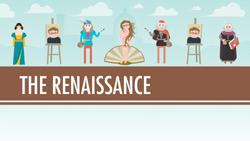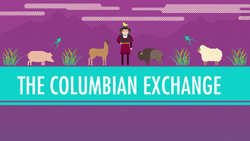| Napoleon Bonaparte dominated French and European history
from 1799 to 1815. During his reign, Napoleon built and lost an empire
and also spread ideas about nationalism in Europe.
The Rise of Napoleon
-
Napoleon, a popular general, overthrew the Directory, set
up a new government called the Consulate, and eventually
took complete power.
Early Life
Napoleon Bonaparte was born in 1769 on the Mediterranean
island of Corsica, which had recently been annexed by France.
When he completed his studies at a well-regarded military
school, he was commissioned a lieutenant in the French army.
He read the French philosophes and studied military
campaigns.
Military Successes
In 1792, Napoleon became a captain.
Two years later, at age 24 and during the Reign of Terror,
the Committee of Public Safety made him a brigadier general.
In 1796, Napoleon became commander of the French forces
in Italy.
In 1797, he returned to France as a hero.
Consul and Emperor
In Paris, Napoleon took part in the Coup d'Etat of
1799 that overthrew the Directory and set up a new government, the
Consulate.
In theory, the Consulate was a republic, but, in fact,
Napoleon held absolute power. Napoleon was called First Consul, a
title borrowed from ancient Rome. He appointed officials, controlled
the army, conducted foreign affairs, and influenced the legislature.
In 1802, Napoleon was made Consul for Life. Two years later, he crowned
himself Emperor Napoleon I.
REVIEW & DO
NOW
Answer the following questions in your spiral notebooks: |
When and where was Napoleon Bonaparte born?
What was his education?
When did he become a captain?
What rank was he promoted to in two years?
How old was he? |
What was the Coup d'Etat of 1799?
What was the Consulate?
Who was First Consul?
What happened in 1802?
What new title did Napoleon give himself in 1804?
How old was he? |
|
|
Napoleonís Domestic Policies
-
Napoleon brought stability to France and established a single
law code that recognized the equality of all citizens before the law.
Peace with the Church
One of Napoleonís first moves at home was to establish
peace with the Catholic Church, the oldest enemy of the French revolution.
Napoleon himself was a man of the Enlightenment.
In 1801, Napoleon came to an agreement with the pope,
which recognized Catholicism as the religion of a majority of the French
people. In return, the pope would not ask for the return of the Church
lands seized in the revolution.
The people who had acquired Church lands became avid supporters
of Napoleon.
Codification of the Laws
Napoleonís most famous domestic achievement was to codify
the laws. Before the legal system, France had 300 different legal
systems. During Napoleonís reign, seven law codes were created.
The most important was the Civil Code, Napoleonís unified
law system.
The Civil Code, or Napoleonic Code, introduced in 1804,
preserved many principles fought for by the revolutionaries fought for,
including equality of all citizens before the law, the right of the individual
to choose a profession, and the abolition of serfdom and the end of all
feudal obligations.
Unfortunately, the Civil Code stated that women were
ďless equal under the law.Ē
A New Bureaucracy
Promotion within Napoleonís government and military was
based on ability.
Napoleon created over three thousand new nobles between
1808 and 1814 with sixty percent of them coming from the middle class.
Preserver of the Revolution?
Napoleon shut down 60 of France's 73 newspapers and banned
books. He insisted at all manuscripts be subjected to government
review before publication.
REVIEW & DO
NOW
Answer the following questions in your spiral notebooks: |
| Was Napoleon a man of the Enlightenment?
What were two terms of the peace Napoleon made with the
Catholic Church?
Had the Church supported the Revolution?
What was the reaction of the people who acquired Church
lands?
What was Napoleon's most famous domestic achievement? |
What as the legal system like in France before Napoleon?
How many law codes did he create?
What was the Civil Code?
How many new nobles did Napoleon create?
How many of them were from the middle class?
Did Napoleon support freedom of speech? |
|
|
Napoleonís Empire
-
As Napoleon conquered Europe, he spread nationalist ideas.
Inspired by those ideas, conquered peoples resisted Napoleonís armies and
helped bring about the collapse of his empire.
Building the Empire
From 1807 to 1812, Napoleon was the master of Europe.
His Grand Empire was composed of three major parts:
First, there was the French Empire, ruled by Napoleon
himself.
Second were the dependent states, ruled by Napoleonís
relatives, including Spain, Holland, the kingdom of Italy (the western
half of Italy north of Rome), the Swiss Republic, Grand Duchy of Warsaw,
and the Confederation of the Rhineóa union of all German states except
for Austria and Prussia.
Third were the allied states defeated by Napoleon and
forced to join his struggle against Britain, including Prussia, Austria,
Russia, and Sweden. They were nominally, at least, self-ruled.
Spreading the Principles of the Revolution
Within his empire, Napoleon sought to spread the principles
of the French Revolution, including legal equality, religious toleration,
and economic freedom. Napoleon hoped his Grand Empire would last
for centuries, but his empire collapsed almost as rapidly as it was formed.
There were two major reasons for its collapse: British resistance
and the rise of nationalism.
British Resistance
Napoleon was never able to conquer Great Britain because
of its sea power, which made it nearly invulnerable. After his defeat
in the sea battle of Trafalgar in 1805, Napoleonís plans for invasion were
ended.
Instead of invasion, Napoleon turned to his Continental
System to defeat Britain. The goal of the Continental System
was to cut off trade between Britain and Europe. By weakening Britain
economically, Napoleon hoped to destroy its ability to make war.
Nationalism
A second important factor in the defeat of Napoleon was
nationalismóthe
sense of unique identity of a people based on common language, religion,
and national symbols. When Napoleon marched his armies through the
dependent and allied states, they were united against the invaders by their
nationalist feelings.
REVIEW & DO
NOW
Answer the following questions in your spiral notebooks: |
What were the three parts of Napoleon's Grand Empire?
Describe and give the rulers of each part.
What principles of the French Revolution did Napoleon
want to spread?
What were the two major reason's for the collapse of the
Grand Empire? |
Why was Napoleon never able to conquer Great Britain?
What ended his hopes of invating England?
What was the Continetal System?
What is Nationalism? |
|
|
The Fall of Napoleon
-
After major losses in Russia and Austria, Napoleon w defeated
at Waterloo.
Disaster in Russia
Russia left the Continental System, leaving Napoleon
little choice but to invade. He knew he had to punish Russia or other
countries would follow suit.
In June, 1812 Napoleon's Grand Army of 600,000 men entered
Russia.
The Russians burned their villages and fields, leaving
no food or provisions for his army to live on. Lacking food and supplies,
his army finally abandoning Russia in October.
When winter set in, thousands of soldiers died and starved
to death. Only 40,000 soldiers survived when the army reached Poland
in January of 1813.
The Final Defeat
At Waterloo in Belgium on June 18, 1815,
Napoleon suffered a final, bloody defeat from a combined British and Prussian
army under the Duke of Wellington.
Napoleon was captured alive.
He was exiled to St. Helena, a small island in the south
Atlantic.
He remained there until his death in 1821, but his memory
haunted French politics for decades.
REVIEW & DO
NOW
Answer the following questions in your spiral notebooks: |
Why did Napoleon invade Russia?
When did Napoleon invade? How many men were in
his Grand Army?
How did the Russians respond?
How did this affect the Grand Army? |
How many of Napoleon's soldiers died after winter set
in?
When and where was Napoleon's final defeat?
Was he killed?
What was his fate? |
|
|
|





